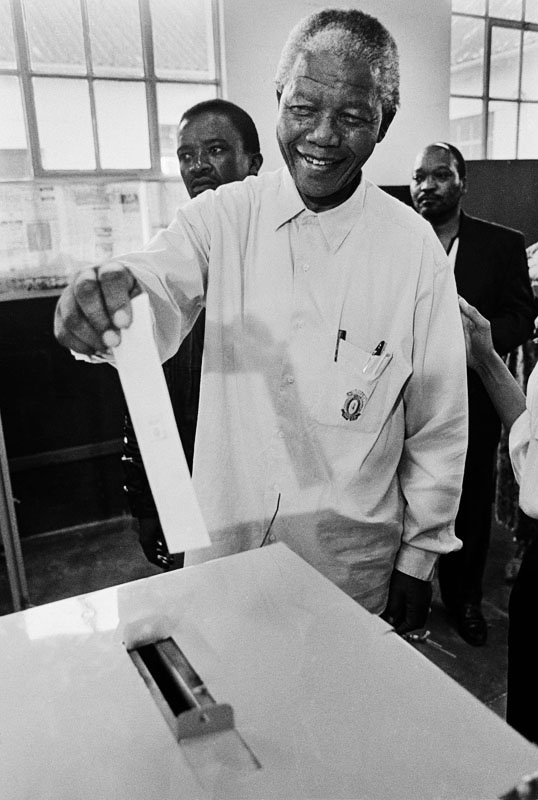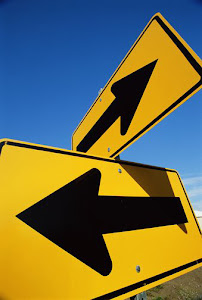quarta-feira, julho 18, 2018
Mandela nasceu há cem anos...!
Postado por
Fernando Martins
às
01:00
0
bocas
![]()
Marcadores: África do Sul, Madiba, Nelson Mandela, Prémio Nobel
terça-feira, dezembro 05, 2017
Madiba morreu há quatro anos
Postado por
Fernando Martins
às
04:00
0
bocas
![]()
Marcadores: África do Sul, Madiba, Nelson Mandela
sexta-feira, março 17, 2017
O referendo que acabou com o apartheid foi há 25 anos
| Election results | ||||
|---|---|---|---|---|
| Yes or no | Votes | Percentage | ||
| 1,924,186 | 68.73% | |||
| 875,619 | 31.27% | |||
| Valid votes | 2,799,805 | 99.82% | ||
| Invalid or blank votes | 5,142 | 0.18% | ||
| Total votes | 2,804,947 | 100.00% | ||
| Voter turnout | 85.08% | |||
| Electorate | 3,296,800 | |||
| Result | Number of votes | Percentage |
|---|---|---|
| Yes | 1,924,186 | 68.73% |
| No | 875,619 | 31.27% |
Aftermath
Postado por
Fernando Martins
às
00:25
0
bocas
![]()
Marcadores: África do Sul, ANC, apartheid, F.W. de Klerk, hino da África do Sul, Liberdade, Nelson Mandela, referendo, referendo de 12 de março de 1992 da África do Sul
sábado, dezembro 05, 2015
Mandela morreu há dois anos...
Postado por
Fernando Martins
às
02:00
0
bocas
![]()
Marcadores: África do Sul, Nelson Mandela, Prémio Nobel, Presidente da República
quarta-feira, fevereiro 11, 2015
Mandela foi libertado há 25 anos!
Postado por
Fernando Martins
às
00:25
0
bocas
![]()
Marcadores: África do Sul, ANC, apartheid, Liberdade, Nelson Mandela
sexta-feira, dezembro 05, 2014
Mandela morreu há um ano...
Postado por
Fernando Martins
às
10:00
0
bocas
![]()
Marcadores: África do Sul, Nelson Mandela, Prémio Nobel
quinta-feira, junho 12, 2014
Há 50 anos Nelson Mandela foi condenado a prisão perpétua no chamado Julgamento de Rivonia
Postado por
Fernando Martins
às
00:50
0
bocas
![]()
Marcadores: África do Sul, ANC, apartheid, Julgamento de Rivonia, Nelson Mandela
terça-feira, fevereiro 11, 2014
Nelson Mandela foi libertado há 24 anos
Nelson Rolihlahla Mandela (Mvezo, 18 de julho de 1918 - Joanesburgo, 5 de dezembro de 2013) foi um advogado, líder rebelde e presidente da África do Sul de 1994 a 1999, considerado como o mais importante líder da África Negra, vencedor do Prémio Nobel da Paz de 1993, e Pai da Pátria da moderna nação sul-africana.
Postado por
Fernando Martins
às
02:40
0
bocas
![]()
Marcadores: África do Sul, direitos humanos, Liberdade, Nelson Mandela
sábado, dezembro 14, 2013
Adeus, Madiba...
Não o vimos
Não vimos Mandela
No lugar onde está
No lugar onde é mantido
Postado por
Fernando Martins
às
22:55
0
bocas
![]()
Marcadores: África do Sul, Asimbonanga, flash mob, Johnny Clagg, Madiba, música, Nelson Mandela, Soweto Gospel Choir
sexta-feira, dezembro 13, 2013
O homem que falava de mais...
Postado por
Fernando Martins
às
20:36
0
bocas
![]()
Marcadores: Barack Obama, funeral, Humor, língua gestual, Nelson Mandela
quinta-feira, dezembro 05, 2013
Morreu Nelson Mandela...
Postado por
Fernando Martins
às
23:59
0
bocas
![]()
Marcadores: 10000 mil anos depois entre a Vénus e Marte, África do Sul, apartheid, direitos humanos, Free Nelson Mandela, Liberdade, música, Nelson Mandela, The Specials
quinta-feira, julho 18, 2013
Mandela - 95 anos!
Postado por
Fernando Martins
às
09:50
0
bocas
![]()
Marcadores: África do Sul, apartheid, democracia, direitos humanos, Mandela Day, Nelson Mandela, paz, Prémio Nobel
quarta-feira, junho 12, 2013
Mandela foi condenado a prisão perpétua há 49 anos
Mandela declarou, diante do tribunal, que aquele era "um julgamento das aspirações do povo africano".
Em 11 de junho de 1964 Mandela recebe uma pena de prisão perpétua.
Postado por
Fernando Martins
às
23:49
0
bocas
![]()
Marcadores: África do Sul, apartheid, Nelson Mandela, Prémio Nobel
domingo, agosto 05, 2012
Mandela foi preso há 50 anos
Postado por
Fernando Martins
às
00:05
0
bocas
![]()
Marcadores: África do Sul, apartheid, direitos humanos, Nelson Mandela
quarta-feira, julho 18, 2012
Nelson Mandela - 94 anos!
Postado por
Fernando Martins
às
09:40
0
bocas
![]()
Marcadores: África do Sul, Mandela Day, Nelson Mandela, Prémio Nobel
sexta-feira, abril 27, 2012
Há 18 anos os sul-africanos elegeram (todos e democraticamente) o seu Presidente e deputados
Postado por
Fernando Martins
às
00:18
0
bocas
![]()
Marcadores: 27 de abril de 1994, África do Sul, apartheid, Congresso Nacional Africano, democracia, eleições, Liberdade, Nelson Mandela
domingo, março 18, 2012
O Homem que libertou Mandela (e partilhou o Nobel da Paz com ele) nasceu há 76 anos
Postado por
Fernando Martins
às
13:10
0
bocas
![]()
Marcadores: África do Sul, apartheid, F.W. de Klerk, Nelson Mandela, paz, Prémio Nobel
sábado, março 17, 2012
Há vinte anos os sul-africanos brancos decidiram acabar com o apartheid
Do you support continuation of the reform process which the State President began on February 2, 1990, and which is aimed at a new constitution through negotiation?
| Election results | ||||
|---|---|---|---|---|
| Yes or no | Votes | Percentage | ||
| 1,924,186 | 68.73% | |||
| 875,619 | 31.27% | |||
| Valid votes | 2,799,805 | 99.82% | ||
| Invalid or blank votes | 5,142 | 0.18% | ||
| Total votes | 2,804,947 | 100.00% | ||
| Voter turnout | 85.08% | |||
| Electorate | 3,296,800 | |||
| Result | Number of votes | Percentage |
|---|---|---|
| Yes | 1,924,186 | 68.73% |
| No | 875,619 | 31.27% |
Aftermath
Postado por
Fernando Martins
às
00:20
0
bocas
![]()
Marcadores: África do Sul, ANC, apartheid, F.W. de Klerk, Liberdade, Nelson Mandela, referendo, referendo de 12 de março de 1992 da África do Sul
segunda-feira, julho 18, 2011
Mandela Day
It was 25 years they take that man away
Now the freedom moves in closer every day
Wipe the tears down from your saddened eyes
They say Mandela's free so step outside
Oh oh oh oh Mandela day
Oh oh oh oh Mandela's free
It was 25 years ago this very day
Held behind four walls all through night and day
Still the children know the story of that man
And I know what's going on right through your land
25 years ago
Na na na na Mandela day
Oh oh oh Mandela's free
If the tears are flowing wipe them from your face
I can feel his heartbeat moving deep inside
It was 25 years they took that man away
And now the world come down say Nelson Mandela's free
Oh oh oh oh Mandela's free
The rising suns sets Mandela on his way
Its been 25 years around this very day
From the one outside to the ones inside we say
Oh oh oh oh Mandela's free
Oh oh oh set Mandela free
Na na na na Mandela day
Na na na na Mandela's free
25 years ago
What's going on
And we know what's going on
Cos we know what's going on
Postado por
Adelaide Martins
às
19:00
0
bocas
![]()
Marcadores: apartheid, concerto, Mandela Day, música, Nelson Mandela, Simple Minds
Free Mandela Concert - 88
UB40 - Sing our own song
The great flood of tears that we`ve cried
For our brothers and sisters who`ve died
Over four hundred years
Has washed away our fears
And strengthened our pride
Now we turn back the tide
We will no longer hear your command
We will sieze the control from your hand
We will fan the flame
Of our anger and pain
And you`ll feel the shame
For what you do in gods name
We will fight for the right to be free
We will build our own society
And we will sing, we will sing
We will sing our own song
When the ancient drum rythms ring
The voice of our forefathers sings
Forward Africa run
Our day of freedom has come
For me and for you
Amandla Awethu
We will fight for the right to be free
We will build our own society
And we will sing, we will sing
We will sing our own song
Postado por
Pedro Luna
às
18:31
0
bocas
![]()
Marcadores: Amandla Awethu, música, Nelson Mandela, reggae, Sing our own song, UB40
.jpg)






